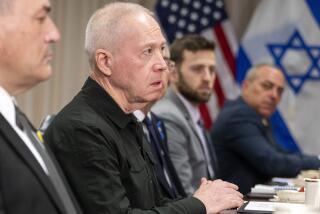Defense chiefs call for wider war on militants
- Share via
WASHINGTON — Warning that the U.S. is “running out of time” in Afghanistan, the military’s top uniformed officer said Wednesday that officials have asked for a “new, more comprehensive strategy” that also encompasses militants’ havens in neighboring Pakistan.
Appearing before a House committee, Adm. Michael G. Mullen, the chairman of the Joint Chiefs of Staff, said such a strategy was crucial to the ability of U.S.-led forces to counter a comeback by extremist groups in Afghanistan.
“I’m not convinced we’re winning in Afghanistan,” said Mullen, although he added, “I’m convinced we can.”
The appearance by Mullen and Defense Secretary Robert M. Gates before the House Armed Services Committee highlighted the problems facing military leaders in Afghanistan. They need more troops but must await U.S. force reductions in Iraq for extra units. And they need cooperation from Pakistan’s new leaders to target extremist sites there.
Both Mullen and Gates emphasized that the military and the broader U.S. government must view the insurgency in Afghanistan and the threat from Pakistan’s tribal regions as a single problem.
“Until we work more closely with the Pakistani government to eliminate the safe havens from which they operate,” Mullen said, “the enemy will only keep coming.”
“The war on terror started in this region; it must end there,” Gates said.
However, hashing out a strategy with the Pakistani government is not likely to be easy. The question remains how much latitude the United States will be given to maneuver in the border region. The U.S. has stepped up Predator strikes and resorted to ground force missions inside Pakistan.
However, the U.S. moves are deeply unpopular there. In his first public comments on the raids, the Pakistani army chief of staff, Gen. Ashfaq Kayani, lashed out Wednesday, vowing that his country’s sovereignty would be defended “at all cost.”
Senior Defense officials noted that Pakistanis who favor a crackdown on terrorism have been pushing a long-term strategy, while American commanders worry more about short-term targets. That has created tension.
“They want to take long-term measures; they want to drain the swamp and then take care of the alligators,” said a senior Defense official, who spoke on condition of anonymity when discussing internal assessments of the situation. “But Americans are impatient people. We want immediate results, and historically we are less concerned about the swamp than about the alligators in it.”
Mullen has spoken frequently about the need for more troops in Afghanistan. President Bush announced this week that he would cut the number of troops in Iraq by 8,000 during the final months of his administration and shift some units to Afghanistan.
Administration critics, including Democratic presidential nominee Barack Obama, said Bush’s Iraq reductions were insufficient and the number of extra troops for Afghanistan too few. The final recommendation, Mullen said, was a compromise among key military leaders.
In his congressional testimony, Mullen provided few hints of a likely new approach. However, he said it should involve a renewed effort to build Afghanistan’s agriculture system, its economic health and its schools.
“We cannot kill our way to victory,” Mullen said.
Mullen has made five trips to the region this year to develop ties with Pakistan’s military leadership. Senior U.S. officials have said that Mullen, in meetings with Kayani, has stressed the importance of reshaping the Pakistani army into a counterinsurgency force.
Some of that courting of Kayani may be bearing fruit. Last month, the Pakistani army moved additional forces into the tribal areas. And Pentagon officials believe that a long-delayed program in which American forces are to train Pakistani soldiers operating in the tribal areas will begin in about a month.
With the new Pakistani civilian government finding its way, some U.S. military leaders are loath to step up lethal U.S. action.
Rep. Ike Skelton (D-Mo.), the chairman of the House Armed Services Committee, criticized Gates and Mullen for the decision not to transfer more troops from Iraq to Afghanistan.
“I ask you: When will the conditions in Iraq be good enough and the conditions in Afghanistan deteriorate enough to warrant the re-prioritization and focus of resources that is required to ensure the long-term success of the Afghanistan mission?” Skelton said.
Gates urged caution on Iraq cutbacks. The U.S. will remain in Iraq “for years to come,” Gates said, but added that the military’s involvement would become increasingly limited.
“I believe we have now entered that endgame, and our decisions today and in the months ahead will be critical to regional stability and our national security interests for years to come,” Gates said.
Further withdrawals, Gates noted, will be left to the next administration. But he urged the next president to listen to military commanders who oppose a rigid timeline for withdrawing forces from Iraq.
“I would urge our nation’s leaders to implement strategies that, while steadily reducing our presence in Iraq, are cautious and flexible,” Gates said, “and take into account the advice of our senior commanders and military leaders.”
--
Times staff writer Greg Miller in Washington and special correspondent Mubashir Zaidi in Islamabad, Pakistan, contributed to this report.
More to Read
Sign up for Essential California
The most important California stories and recommendations in your inbox every morning.
You may occasionally receive promotional content from the Los Angeles Times.










